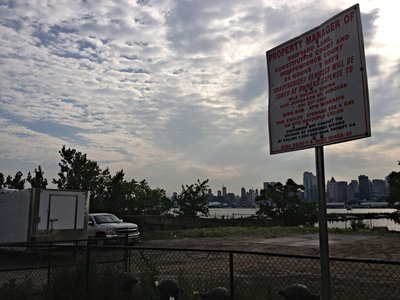Mayor Dawn Zimmer has sent a strongly-worded letter to the Hoboken City Council asking for $100,000 more to fight a lawsuit filed by a local developer who wants to build two residential buildings on the 15th Street pier. The city has already paid one law firm $340,000 to fight the project.
The developer, Shipyard Associates, which built the original Shipyard residential project on the Hoboken waterfront in the 1990s, is arguing against a recently passed pair of city ordinances barring construction on piers. Shipyard says the ordinances are aimed at derailing their proposed 11-story “Monarch” project, even though a judge recently approved it after a nearly decade-long land use struggle.
The ordinances, which were proposed by the Zimmer administration and passed by the council last month, are described as an effort to protect Hoboken from future Hurricane Sandy-type events. Experts have testified before the council on multiple occasions that if buildings were to be constructed on Hoboken’s piers, it would be difficult for emergency service workers to reach them in a serious flood.
“Despite losing two previous legal challenges to the project, the administration continues to disregard Shipyard’s rights.” – Kevin Coakley
____________
Shipyard Associates filed a lawsuit last month against the city, arguing that the ordinances are simply a mechanism to ignore a legal process that just last month granted the project approval. The Zimmer administration has been very cautious about development.
“The administration’s deliberate attempt to circumvent the zoning process has led to a prolonged litigation initiated by the city that is frivolous, a financial burden to taxpayers, and politically motivated,” said Kevin Coakley, an attorney for Shipyard Associates, in a statement Thursday. “Despite losing two previous legal challenges to the project, the administration continues to disregard Shipyard’s rights under Municipal Land Use Law and the City’s Zoning Ordinance.”
But the City Council agreed with Zimmer. A council resolution that passed 9-0 on March 5 has granted the city’s land use law firm, Maraziti Falcon & Healey, an additional $100,000 on top of $340,000 the firm has already been promised.
“The city maintains that the ordinances are an appropriate measure to protect public safety from the well-documented flood hazard threats posed by major storm events such as Superstorm Sandy,” wrote Zimmer. “I am extremely committed to defending the city’s interests and we intend to vigorously defend against Shipyard’s lawsuit.”
What’s in the lawsuit?
In addition to the claim that the city’s ordinances are aimed unfairly at the Monarch projects, Shipyard’s lawsuit makes a number of other substantial charges, which Zimmer referred to in her letter.
According to the letter, Shipyard is also arguing that state and federal law preempt and exceed Hoboken’s municipal authority in the matter and that the ordinances constitute a case of illegal “reverse spot zoning,” meaning that they single out the Monarch project for “disadvantageous development restrictions.”
Additionally, Shipyard is arguing that the ordinances should not apply to them because their projects were proposed, then approved, before the ordinances were adopted by the city, and that the ordinances constitute a municipal “taking” of Shipyard’s property without compensation.
How did it come to this?
The project was first approved by the city’s Planning Board, which oversees approves such projects, in 1997. That plan included the construction of three tennis courts in addition to around 1,000 residential units.
In 2012, Shipyard (a subsidiary of Ironstate Development) decided to do away with the tennis courts, replacing them with the two luxury apartment buildings. The change, under the 1997 Planning Board agreement, was apparently permissible without requiring new board approval.
But the city sued in an effort to force Ironstate to stick to their original plan to build the courts.
A legal ruling arising from the lawsuit mandated that the city’s Planning Board hold a hearing on the merits of the project’s new plan before a judge made a final decision. Apparently the hearing was not held in time but the Planning Board nevertheless issued a resolution denying the application.
As a result, in late January, a Superior Court judge ended a long battle over the project when he approved it on a technicality, ruling that the Hoboken Planning Board failed to uphold the court-mandated order to give the Monarch project a fair hearing.
“The Planning Board contends that this denial constituted an ‘act’ sufficient to satisfy the automatic approval provision, and that automatic approval is otherwise inappropriate,” wrote Judge Nesle A. Rodriguez at the time. “The Planning Board’s complete disregard of its statutory duty to hold a hearing on the merits constitutes a failure to act.”
Now, Shipyard is arguing that Zimmer’s ordinance is attempting to pick up the pieces left by the Hoboken Planning Board’s failure to act.
“These actions are highly questionable and come with a significant cost to the city’s taxpayers,” said Coakley. “All we ask is for the administration to recognize our statutory rights.”
Dean DeChiaro may be reached at deand@hudsonreporter.com
